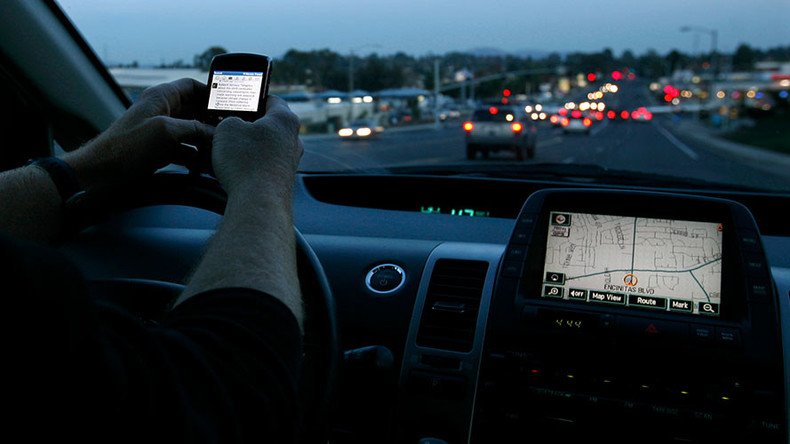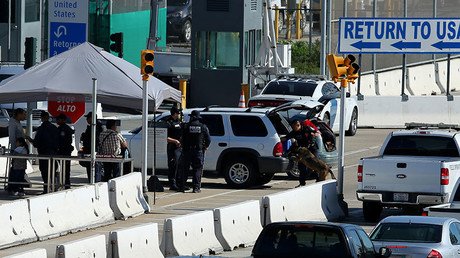Chicago lawmakers ask police to use ‘textalyzer’ to prevent texting & driving

Texting while driving can be distracting. To stop the deadly practice, Chicago lawmakers are looking to a new piece of technology that detects whether a motorist was texting while driving. However, civil rights groups warn its use would be an invasion of privacy.
Two Chicago, Illinois aldermen ‒ City Council Finance Committee Chair Edward Burke (14th) and Transportation Committee Chair Anthony Beale (9th) ‒ introduced a resolution urging the Chicago Police Department to consider using technology that would tell police if a driver was swiping, tapping, texting or otherwise distracted by a cell phone in the moments before an accident.
The technology is still being developed by the Israeli tech firm Cellebrite, which claims it can access a cell phone’s operating system to check when a phone had been used and if it had received or transmitted messages in the moments before an accident.
The information would also allow police to gather information that would further their understanding of how text messages contribute to car accidents.
“Everywhere you look on Chicago streets and on expressways, drivers are texting,” Beale said in a Finance Committee press release. ”Such illegal activity not only poses a serious threat to other motorists, but also to the many cyclists who regularly use our network of bike lanes and to pedestrians at crosswalks.”
The National Highway Traffic Safety Administration estimated that 3,477 people were killed and 391,000 were injured in motor vehicle crashes involving distracted drivers in 2015.
Currently 46 states, Washington DC, Puerto Rico, Guam and the US Virgin Islands all have bans on texting while driving, according to the Governors Highway Safety Association. Illinois has some of the harshest laws, prohibiting all drivers from using hand-held cellphones while driving.
Lawmakers in New York and Tennessee also introduced similar legislation earlier this year, which would provide police with so-called textalyzers the same way they currently equipped with breathalyzers for testing blood alcohol levels.
Under the proposed legislation, drivers involved in accidents would be required to hand over their cell phones to authorities. Drivers who refuse could have their licenses suspended, similar to the penalty for refusing to take a breathalyzer test.
“Our nation is in the grips of a texting epidemic and drivers text with impunity because they think there is little chance of ever getting caught,” Burke said.
Lawmakers also proposed using the technology at "text stops" along major highways, where police will perform random searches of driver’s cellphones similar to a drunk-driving checkpoint.
“When a motorist is pulled over for suspicion of drinking and driving, police routinely use a breathalyzer during traffic stops. Why not also be able to use a textalyzer, or similar device to determine if a driver was engaging in distracted driving?” Burke said.
Some civil rights groups think the technology could lead to an invasion of privacy. Donna Lieberman, executive director of American Civil Liberties Union (ACLU) of New York, says that the technology “invites police to seize phones without justification or warrant,” according to the New York Times.
"If this device is intended to capture information from my phone, what information is collected and how do I know that the information is limited?" asked ACLU of Illinois Communication Director Ed Yohnka, according to Chicagoist.
It's not clear whether #textalyzer can help curb distracted driving without putting privacy and civil liberties at risk. 🤔
— NYCLU (@NYCLU) April 13, 2016
Cellebrite, the company behind the textalyzer, claims that the only certain information can be accessed by the device.
"There's no user content displayed whatsoever. No phone numbers, no content of texts, no images," said Mo Cook of Cellebrite, according to ABC News.
The idea came from Ben Lieberman, a New York father who lost his 19-year-old son in a car accident. Records showed the driver’s phone was in use moments before the accident. However, the process of filing a lawsuit against the driver and subpoenaing phone records to prove the phone was in use while driving took a lot of time and money.
“I have often heard there is no such thing as a breathalyzer for distracted driving, so we created one,” said Lieberman, according to CNBC. “Respecting drivers’ personal privacy, however, is also important, and we are taking meticulous steps to not violate those rights.”













